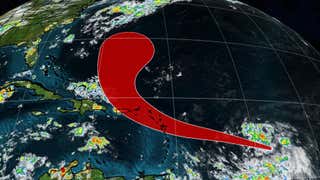
Watches Issued In Caribbean For Future Ernesto
The 2021 Atlantic hurricane season is already off to a fast start, even faster than the 2020 season in several aspects.
Tropical Storm Elsa formed on July 1. That's the earliest fifth named storm of any Atlantic hurricane season on record, besting the previous record set just last year by Edouard on July 5, 2020.
That's also over six weeks earlier than the average date of the fifth storm - August 18 - from 1991 through 2020. In eight of those 30 years from 1991 through 2020, the fifth storm didn't arrive until September.
"Even in the satellite era, a fifth storm in early July was unthinkable before 2020, and we were a few hours away from squeezing it into June 2021," tweeted Eric Blake, senior hurricane specialist at the National Hurricane Center.
Elsa then became the season's first hurricane on July 2 near Barbados in the Windward Islands.
That was a whopping 23 days earlier in the calendar than 2020's first hurricane of the season - Hanna - in the Gulf of Mexico.
Then there's the matter of where Elsa developed so early.
Typically in June or early July, very little development occurs east of the Windward Islands due to the early-season progression of dry, dusty air from the Sahara Desert - such as what happened late last June - and stronger wind shear over the Caribbean Sea.
But Elsa developed in the "main development region" east of the Windward Islands and became a hurricane, no less.
According to NOAA's Hurricane Research Division, early-season activity in this part of the tropical Atlantic Ocean strongly correlates to a more active hurricane season.

Through July 5, there had also been five storms in the 2020 hurricane season. But that season's fifth storm, Edouard, developed four days later than Elsa, as we mentioned earlier.
Bertha and Cristobal had already made U.S. landfalls in 2020, two of what would be a record 11 total mainland U.S. landfalling storms.
This season, Claudette was born just inland over Louisiana, then Danny quickly swept into South Carolina.

The 2020 hurricane season generated a record 30 named storms. Fourteen of those became hurricanes, just one shy of the seasonal record.
Another Record Season?
As mentioned earlier, where and when Elsa formed is a strong indicator of an active season.
However, NOAA's Hurricane Research Division emphasized the overall number of named storms and hurricanes in June and July doesn't correlate well with the rest of the season's activity.
In the satellite era (since 1966), about 77 percent of all storms and 87 percent of all hurricanes formed in the peak months from August through October.
If anything, this early activity is a reminder that the time to prepare for another hurricane season is now.
The Weather Company’s primary journalistic mission is to report on breaking weather news, the environment and the importance of science to our lives. This story does not necessarily represent the position of our parent company, IBM.



